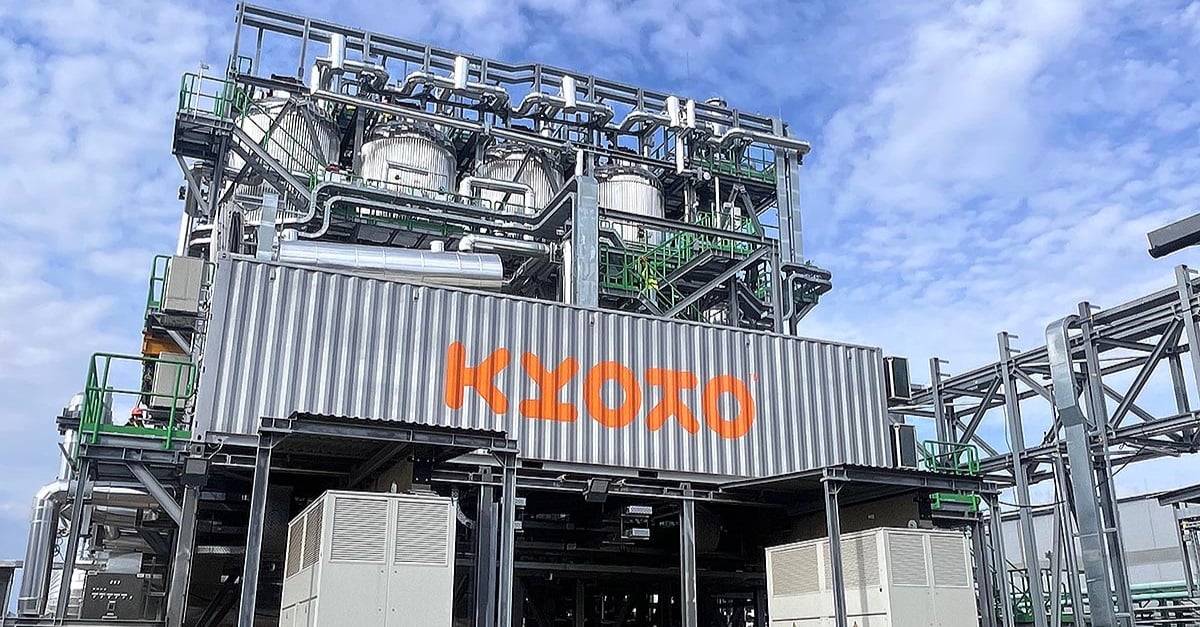Business
Kyoto Group Unveils 56MWh Thermal Energy System in Hungary

Kyoto Group has introduced a new thermal energy storage system at the KALL Ingredients corn processing plant in Tiszapüspöki, Hungary. On 9 October 2023, the Norway-based technology company announced the deployment of its Heatcube technology, which aims to replace natural gas usage in the facility. This innovative system is expected to significantly reduce carbon emissions while providing consistent and cost-effective industrial heat.
The 56MWh Heatcube is designed to deliver over 30GWh of process heat annually. This capacity not only enhances energy efficiency but also allows the KALL Ingredients plant to operate more sustainably. The Heatcube can charge at a capacity ranging from 10-20MW and discharge at up to 14MW, making it versatile for various industrial applications.
Kyoto Group’s Heatcube technology utilizes resistive heaters that convert electricity into heat, which is then stored in molten salt. This process is highly efficient, boasting a round-trip efficiency (RTE) of over 93% and a usable energy storage density of approximately 280kWh/m2. The system is also designed for a lifespan exceeding 25 years and can provide steam at temperatures between 150 and 300 degrees Celsius.
Strategic Partnerships and Business Model
The installation at KALL Ingredients was made possible through partnerships with major stakeholders, including majority investor Kyotherm and energy trading partner Energiabörze, a Hungary-based trader and aggregator. KALL Ingredients has chosen a 15-year heat-as-a-service agreement with Kyoto Group, a model that allows companies to access advanced technology without the upfront capital costs.
In addition to enhancing energy efficiency, the Heatcube will participate in flexibility markets, charging with renewable energy whenever available. This approach aligns with Kyoto Group’s mission to decarbonize industrial processes, addressing a critical need in sectors that are traditionally hard to electrify.
Challenges and Competition in the Market
While thermal energy storage presents a promising solution for reducing emissions in industrial settings, several challenges remain. Ensuring high-quality, consistent heat—especially at elevated temperatures—can complicate adoption. Additionally, a seamless transition from existing energy sources to the new system is crucial for end-user satisfaction.
Kyoto Group’s entry into this space follows its first deployment in Denmark earlier in 2023. The company joins a growing list of competitors in the thermal storage market, including firms from Israel and the United States, as well as other Scandinavian companies specializing in molten salt storage. Furthermore, companies like Finland’s Sand Battery are targeting lower-temperature thermal storage for domestic district heating, showcasing the diverse applications of thermal energy technology.
As industries seek to lower their carbon footprints, the successful implementation of systems like the Heatcube at KALL Ingredients could set a precedent for future projects across Europe and beyond. The integration of renewable energy sources into these systems will be vital for achieving sustainability goals while maintaining operational efficiency.
-

 Entertainment1 month ago
Entertainment1 month agoAnn Ming Reflects on ITV’s ‘I Fought the Law’ Drama
-

 Entertainment2 months ago
Entertainment2 months agoKate Garraway Sells £2 Million Home Amid Financial Struggles
-

 Health1 month ago
Health1 month agoKatie Price Faces New Health Concerns After Cancer Symptoms Resurface
-

 Entertainment1 month ago
Entertainment1 month agoCoronation Street’s Carl Webster Faces Trouble with New Affairs
-

 Entertainment1 month ago
Entertainment1 month agoWhere is Tinder Swindler Simon Leviev? Latest Updates Revealed
-

 Entertainment2 months ago
Entertainment2 months agoKim Cattrall Posts Cryptic Message After HBO’s Sequel Cancellation
-

 Entertainment2 months ago
Entertainment2 months agoMasterChef Faces Turmoil as Tom Kerridge Withdraws from Hosting Role
-

 Entertainment3 months ago
Entertainment3 months agoSpeculation Surrounds Home and Away as Cast Departures Mount
-

 World1 month ago
World1 month agoCole Palmer’s Mysterious Message to Kobbie Mainoo Sparks Speculation
-

 Entertainment1 month ago
Entertainment1 month agoITV’s I Fought the Law: Unraveling the True Story Behind the Drama
-

 Entertainment4 weeks ago
Entertainment4 weeks agoCaz Crowned Winner of The Great British Sewing Bee, Overjoyed by Triumph
-

 Entertainment2 months ago
Entertainment2 months agoAldi Launches Cozy Autumn Fragrance Range Ahead of Halloween





















